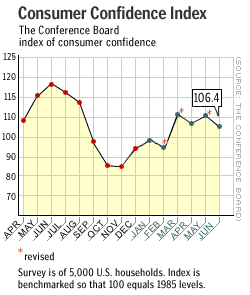(Following is an updated version of an article that first ran on July 24, 2002)
NEW YORK (CNN/Money) -- Economists have said over and over again that the U.S. economy is too strong to be stopped by a little thing like plunging stock prices -- but many are beginning to concede that the economy could get more than a bloody nose if a stubborn bear market holds on much longer.
"The behavior of equity prices from here can make the economy heaven or hell," Rory Robertson, interest-rate strategist at Macquarie Equities (USA), said in a research note. "The further equity prices fall, the gloomier consumers and business people will become, the more corporate and financial disasters will be unearthed, and the less willing lenders will be to lend and spenders to spend."
Consumers, many of whom have seen their retirement savings vaporized in the recent stock downturn, have already started to fret about the future.

The University of Michigan's closely watched consumer sentiment index dipped in July -- though not as badly as first thought -- and the ABC/Money consumer comfort index dropped in the week ended July 7 to the lowest level in five months.
The Conference Board's July consumer confidence index is due next Tuesday, and economists expect that to drop to 102 from 106.4 in June.
"We now really have reached a level where it's cutting through fat and actually reaching bone in terms of what people can bear," said Christoph Bianchet, U.S. economist at Credit Suisse Asset Management.
Bianchet said he thought there was a 50/50 chance that consumers could give up hope of ever recovering their stock losses and significantly cut back spending.
"At this point it's a lot of guesswork, but from anecdotal evidence it looks like people are starting to cut back," he said.
This could be awful news, since consumer spending makes up about two-thirds of all economic activity in the United States and helped lessen the pain of a recession that began in March 2001 and supposedly ended sometime this year.
Worse, a cutback in spending would also spoil other pieces of the economic pie, causing inventories to pile up and businesses to abandon their own spending plans.
"I'm not predicting a double-dip recession, but the odds of it have gone up," said Robert MacIntosh, chief economist and portfolio manager at Eaton Vance Management. "Instead of 5 percent, there's maybe a 15 or 20 percent chance of it now."
Business spending also under pressure
Economists have a harder time linking falling stock prices to business spending, which Federal Reserve Chairman Alan Greenspan has called the linchpin of the recovery.
But falling stock prices are making it difficult to raise capital in equity markets, and corporate accounting scandals are making banks leery of extending credit to riskier clients -- especially since so many are already in debt up to their eyeballs.
"The ratio of corporate debt to gross domestic product (GDP) is at an all-time high," said Lacy Hunt, chief economist at Hoisington Investment Management Co. "And we don't know exactly what corporate debt is because so much has been parked off the balance sheet and hidden. But, even without knowing what the off-balance-sheet debt is, corporations have too much."
Economists are still unclear about whether or not a corporate "credit crunch" exists that would impact the economy significantly -- there's no question loans, commercial paper and corporate bond issues are all lower, but it's hard to tell how much of that is lack of demand and how much is a result of tightening standards.
"We're not seeing a credit crunch today. But, with the environment we're in, it's fair to say that everybody's got to be more cautious and is more cautious," J.P. Morgan Chase Corp. CEO Bill Harrison said in a analyst call Wednesday. "For the right deal and the right kind of structure, there is liquidity [available] -- there's just not a lot of demand."
A slowdown in business spending following a glut of spending in the late 1990s led to a long recession in the manufacturing sector, 1.5 million job cuts and the broader recession. In one sense, the prolonged weakness of business spending is reason to hope -- at least it can't get much worse.
"It's hard to fall any more if you're already on the ground," MacIntosh of Eaton Vance pointed out.
Fed to the rescue?
With all these concerns, speculation has naturally begun to swirl that the Federal Reserve, led by Chairman Greenspan, will step in with an emergency interest-rate cut to save the day, as it has during other crises.
The immediate outlook for a Fed rate cut is still pretty slim, most economists believe, since a cut at this moment could be taken as a sign of panic.
"People's outlook for the economy changes much faster than the underlying state of the economy," said Lara Rhame, bond market strategist at Brown Brothers Harriman and a former Fed economist. "The Fed tries to keep its eye on the larger ball and not on the ping-pong ball of the stock market."
Still, such a move can't be ruled out, especially if the stock selloff picks up speed or the economy slips back into recession.
Fortunately, the Fed was allowed this week to postpone such a grim decision for another day -- stocks rallied on Wednesday and rose again on Friday.

|

